And so to the Somme. We went in Matt’s car, with lots of water, and lots of CDs.
It was a full trip…this will be a long blog!
Before I start, look in your diary and try to wedge in a visit to the EXTRAORDINARY exhibition at Whitgift. A better exhibition of the First World War would be very very hard to find. It is a one-of-a-kind event, and the (VERY rare, fascinating) objects will return to private hands in a couple of months. Very reasonable prices indeed, a token price really, 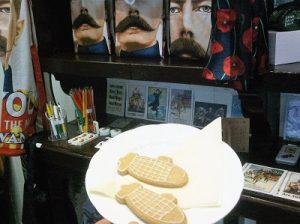 and a lovely cafe with antique furniture and zeppelin shortbreads at the end. It is never crowded and…just go. In South Croydon, you can use your Oyster card to get there, open seven days a week. Even the piano in the Edwardian Drawing-room has history. The Turn of the Screw was written on it! http://www.remembering1916.co.uk/
and a lovely cafe with antique furniture and zeppelin shortbreads at the end. It is never crowded and…just go. In South Croydon, you can use your Oyster card to get there, open seven days a week. Even the piano in the Edwardian Drawing-room has history. The Turn of the Screw was written on it! http://www.remembering1916.co.uk/
Right! The Somme! On the first day we went to the amazing museum in Peronne, Historial de la Grande Guerre. It is in a castle and on a lake, light and modern inside, with THE collection of Otto Dix’s disturbing, incredible, jaw-dropping etchings. They pull no punches. The Historial not only have our CD in their gift shop, it is on a listening post. Parking was a challenge; there were ribbons, traffic cones and stickers everywhere and we asked a guard at the museum why all the restrictions and he said “La visite de la Reine d’Angleterre.” So there we are. Despite our passports’ saying that Her Britannic Majesty requests and requires us to pass freely, the (imminent) presence of Her Britannic Majesty was doing a bit of hindering in that picturesque town. 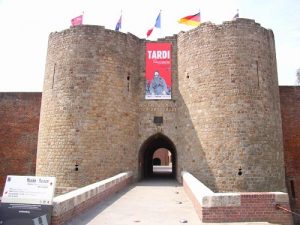
It was a taste of things to come. The security in the region was staggering. One of the reasons I cannot provide decent footage of our big appearance at the German commemoration of the battle of the Somme on the 1st of July is because the Gendarmes wouldn’t let the BBC in because their cameras were too big for their ‘security’. As if they’d be hiding firearms in them? 
The day of our sound-check, we started early and went to the equally lovely town of Albert…This place was event more crowded. With re-enactors, tour-buses, cheese sellers, and a Hundred Pipers. A hundred. From many nations. I spoke with a French biker who loved bagpipes so much his arms and legs were covered in tattoos of them. The tourist office, which is in a converted 1920s swimming-bath, very gladly took delivery of 10 of our CDs and had us do an impromptu performance in said converted swimming bath. There I discovered that “La Madelon” is basically the region’s “Tipperary”. EVERYONE knows it. They sing along, they add interpolations, they dance… I have a photo of Matt playing in this place but none of the two of us, though plenty and plenty were taken. Footage too. I often wonder where this ends up. We must be on hundreds of mobile phones, all told. The museum at Albert, the “Musee Somme 1916” is an atmospheric affair and you descend into these underground passages that were the Basilica’s crypt but used in the war,
I have a photo of Matt playing in this place but none of the two of us, though plenty and plenty were taken. Footage too. I often wonder where this ends up. We must be on hundreds of mobile phones, all told. The museum at Albert, the “Musee Somme 1916” is an atmospheric affair and you descend into these underground passages that were the Basilica’s crypt but used in the war, 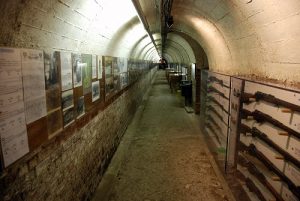 and emerge into a sort of sunken park, where enormous hogs were roasting, and WW1 planes and stalls were all set out for the anniversary. They also have our CD for sale, and although they don’t have listening posts, during their celebrations and fireworks and hog-roast they put the CD on the PA system in the garden. The marvellous woman who organised the festivities wrote to me “The CD was amazing! We thought we were at the beginning of the last century!”
and emerge into a sort of sunken park, where enormous hogs were roasting, and WW1 planes and stalls were all set out for the anniversary. They also have our CD for sale, and although they don’t have listening posts, during their celebrations and fireworks and hog-roast they put the CD on the PA system in the garden. The marvellous woman who organised the festivities wrote to me “The CD was amazing! We thought we were at the beginning of the last century!”
The sound-check for the event at the Fricourt Cemetery for the Volksbund Deutsche Kriegsgräberfürsorge went well…and afterwards the VDK Reservists and the incredible Arne Schrader, Bundeswehr and all-round complete and utter dynamo, went to the English cemetery nearby in Fricourt to lay a wreath, and Matt and I spontaneously performed “Roses of Picardy”. There were roses in that little cemetery as well. Amazing. We had an offer to perform at a restaurant in Albert but after 8pm there was to be a security lockdown and we didn’t want to be caught in it! (click on the image if you’d like it larger) 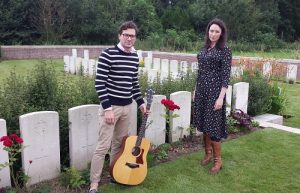
On the 1st, security was so tight in the region because of the royalty and the politicians, we had to have special passes. Once through, it was terribly eerie. No traffic, and the occasional helicopter and the occasional coachload. And ALL the crosses. It is like a patchwork, that region. A large patch of white crosses here, another of stone ones. And the German ones stark black crosses, except for the Jewish graves in them, which are stone and semicircular. And then another patch of white crosses. And again, and again. No end to it.
The ceremony was long, varied, and had representatives from the Gurkhas, the British, New Zealand, Australia, America, France…and young players from the FC Liverpool and Hertha BSC Berlin taking it in turns to read letters from the battlefields in both English and German; a children’s choir from Southport, Australia; a local French choir; German Army Band from Siegburg; and Matt and me. We performed “Bald Allzubalde” and then, after the Southport School Band of Brothers sang the first two verses of Eric Bogle’s “Green Fields of France” Matt modulated down and we sang a French verse, then went up again for one in German. Perhaps footage from someone’s phone will surface. Who knows. It was a large crowd. And an extraordinary occasion. 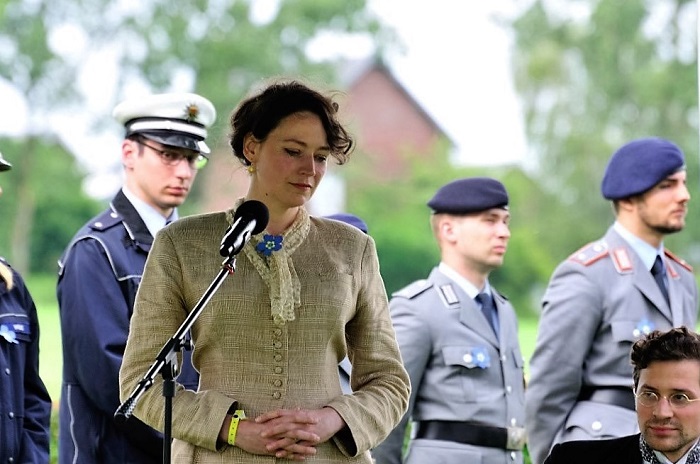 I do wish there had been better UK coverage of it because several people I’ve spoken to since wondered if there WAS any commemorating on the Germans’ part. Well, there absolutely was. They also hired eight portable toilets to put on the main road by the cemetery for the week, and tour-buses kept stopping there for their passengers (mostly from the UK) to unload, which they did with no sign of recognition that these necessary facilities were provided by the Volksbund Deutsche Kriegsgräberfürsorge. I think they reckoned that they’d been placed there by the tour-companies. German Reservists ensured that there was always, always a plentiful supply of toilet roll, as well.
I do wish there had been better UK coverage of it because several people I’ve spoken to since wondered if there WAS any commemorating on the Germans’ part. Well, there absolutely was. They also hired eight portable toilets to put on the main road by the cemetery for the week, and tour-buses kept stopping there for their passengers (mostly from the UK) to unload, which they did with no sign of recognition that these necessary facilities were provided by the Volksbund Deutsche Kriegsgräberfürsorge. I think they reckoned that they’d been placed there by the tour-companies. German Reservists ensured that there was always, always a plentiful supply of toilet roll, as well.
The weather was all over the place. Sudden downpours followed by scorching heat, followed by gales and flurries. We performed under a little tent. Allzeit Bereit, as the Pfadfinder say. At one point, a branch came down. The Reservists, Police Officers from Northern Germany, and Siegburg band stood unflinching.
Afterwards there was a knees-up for the local population which we sang at, and sold out of CDs. The person who went away empty-handed said he’d buy his off my BIG CARTEL page, and…he did! Three copies! I met a fascinating couple from the Netherlands, Hendrik and Hanne. He is a composer and historian, and his WW1 project is well worth looking at. He doesn’t reconstruct what the songs would have sounded like a century ago, as we do, but interprets the poetry and letters from the war in our modern idiom, seeks his own expression of the horrors of the time. It involves spoken word and electric guitars and much else besides. His website is HERE.
The next day, Matt and I performed at the Canadian ceremony at Courcelette. It was to commemorate the 22e Regiment, from Quebec. I found their Regimental song, which so enchanted a local choir director (it is lovely to see how many people living in the region turn up at these events) that he asked for the music, which I very happily gave him. He says that he’ll have his choir perform it. How marvellous that, a hundred years after these young men were singing this song on that very soil, the song should return to it!
There were no tents at this event, except the huge marquee for the celebration and food afterwards (lavish) which made the whole thing airy and light, though terribly exposed. Torrential downpours meant that volunteers and representatives of the Canadian Government scurried about with paper towels twice before the thing started. There was a Bagpiper whose sister lives in the same small town I come from (so Canadian, these connections) and an excellent band. The wind during our number blew the microphone aside at one point, and the camera on the live-stream at another! You can see it on the extract from said live-stream, above…We performed in the Marquee afterward, and it was amazing: again, Madelon proved the big number. Fellows with Canadian flags in their lapels sang it with us. The Hon. Kent Hehr, Minister of Veterans Affairs, came up specially to watch us and tell us that he liked our performance. What an extraordinarily gracious man.
Soon after our return to the UK we performed a Versatility Serenaders gig in the Buxton Festival which we have some footage of, hurrah! If you have not subscribed to my YouTube Page, please do, and then you can see these bits as soon as they’re uploaded. Be prepared to hear “Oh Oh Antonio” as you’ve never heard it before.
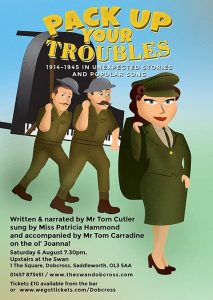 For those up North, or those fancying a trip there, I will be performing “Pack Up Your Troubles” (tickets HERE) with the Two Toms (not their official name, but really they are) Tom Carradine and Tom Cutler, in an evening of song and story from the 1st and 2nd world wars. It will be at The Swan in Dobcross, a really really lovely pub theatre. And at 2pm on that same day, I’ll be assisting at Tom Carradine’s Cockney Singalong, perhaps in the garden, weather-permitting!
For those up North, or those fancying a trip there, I will be performing “Pack Up Your Troubles” (tickets HERE) with the Two Toms (not their official name, but really they are) Tom Carradine and Tom Cutler, in an evening of song and story from the 1st and 2nd world wars. It will be at The Swan in Dobcross, a really really lovely pub theatre. And at 2pm on that same day, I’ll be assisting at Tom Carradine’s Cockney Singalong, perhaps in the garden, weather-permitting!
Our visit to France was incredible. I have here a couple of fragments of footage, and a few photographs, but really only a book would do this trip justice.
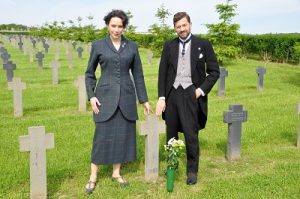
We discovered the amazing work that the Volksbund Deutsche Kriegsgräberfürsorge, the German War Graves Commission, does. The reason for the “Volksbund” is because when Germany was defeated, it was bankrupt, and it was people – Farmers, Priests, Rabbis, old ladies – who helped to bury and record the vast numbers of dead. The Volksbund have been operating through donations from relatives and descendants, and volunteers for the vast majority of their existence and it was only very recently they started to have some government help. 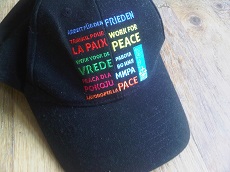 They are still kept going by amazing volunteers, one of whom gave me his baseball cap with their “Peace” logo on it.
They are still kept going by amazing volunteers, one of whom gave me his baseball cap with their “Peace” logo on it.
We also met the young people who are involved so closely with the Volksbund. In fact, within a short time after our arrival at Luxembourg Airport we were whisked along motorways and then into remote French forests which had the unmistakable whiff of the First World War – something about the nature of the terrain, the eerie feel of the place – and in the depths of one of the forests, a campfire where these Scouts were playing guitars and singing old old songs. They were girls and boys and they were called Pfadfinder. Matt immediately blended his guitar with theirs, and I did my best to sing along to their songs. Then we performed “Tipperary”, and then it was nearly 2am but Arne, the incredible man who organises the events that the Volksbund puts on, was telling the children, who looked to be from about 8 to 15 years of age, the many stories of the ongoing discoveries of the Volksbund. Very near the place we were sitting, in the forest of Caures, the remains of Hans Winkelmann were found and identified, and the day after that, we would be burying him beside his beloved brother Karl. That was the big event we were to perform at.
Here is a fragment of footage from it. I apologise that there is no more than this:
But before that, the NEXT day, was something very close to our hearts. We had found an old piece of music, a heart-rending song, scribbled down in a trench in Verdun by the composer Ernst Brockmann. I won’t tell the story again, because at least two past blog posts on this website tell it already. But it was the next day that we were to honour him.

It was damp and the clay round his grave, of course, fresh from the recent exhumation. The Pfadfinder youths, some Reservists from around Brockmann’s area of North Rhine-Westphalia (incidentally, where I finally found the book with his song in it) who had seen active service, 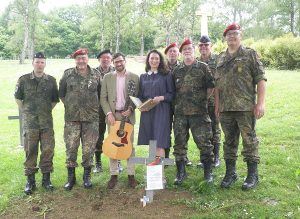 and of course Arne, and Maurice, the Media-man for the Volksbund, all stood in a circle round his cross, which still says “Unbekkanter Deutscher Soldat” and one of the Pfadfinder girls read out his dates and the biography they’d managed to find, and looped a copy of the song around the cross, along with a small German flag. We then performed his song for him, after 100 years of his lying there, unnamed. It was so deeply happy an outcome, at last, that I didn’t feel tears. Not until the Pfadfinder brought out their guitars and sang a regimental song of the 39th Fusiliers, which was so full of hope and youth, and in the setting of all those crosses, truly devastating. No words for it.
and of course Arne, and Maurice, the Media-man for the Volksbund, all stood in a circle round his cross, which still says “Unbekkanter Deutscher Soldat” and one of the Pfadfinder girls read out his dates and the biography they’d managed to find, and looped a copy of the song around the cross, along with a small German flag. We then performed his song for him, after 100 years of his lying there, unnamed. It was so deeply happy an outcome, at last, that I didn’t feel tears. Not until the Pfadfinder brought out their guitars and sang a regimental song of the 39th Fusiliers, which was so full of hope and youth, and in the setting of all those crosses, truly devastating. No words for it. 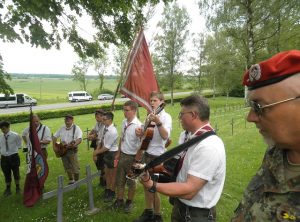
This is why youth are so closely involved with the Volksbund. This is about past and present and future.
We hope we can get some donations for a stone cross with Ernst Brockmann’s name on it.
After the big ceremony the next day, we had a look at the cemetery where Angela Merkel and Francois Hollande were to meet the next day, overlooking the view of where so much blood poured out a hundred years ago, and had a final, quiet and rather melancholy visit to Brockmann, warm rain falling, so very alone in that hillside cemetery. 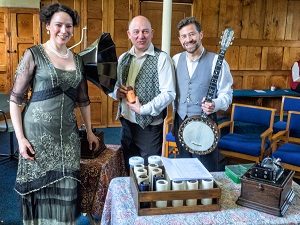 We flew back to Heathrow, drove through the night to North Yorkshire, arrived at 2am, and did the cylinder-making demonstration for the Swaledale Festival the following day. We sold one CD and one cylinder. A devastating commentary on the relevance of the CD!
We flew back to Heathrow, drove through the night to North Yorkshire, arrived at 2am, and did the cylinder-making demonstration for the Swaledale Festival the following day. We sold one CD and one cylinder. A devastating commentary on the relevance of the CD!
It’s too small to tell in this photo, but we each wore our VDK forget-me-not pin. 






One visitor left a comment...